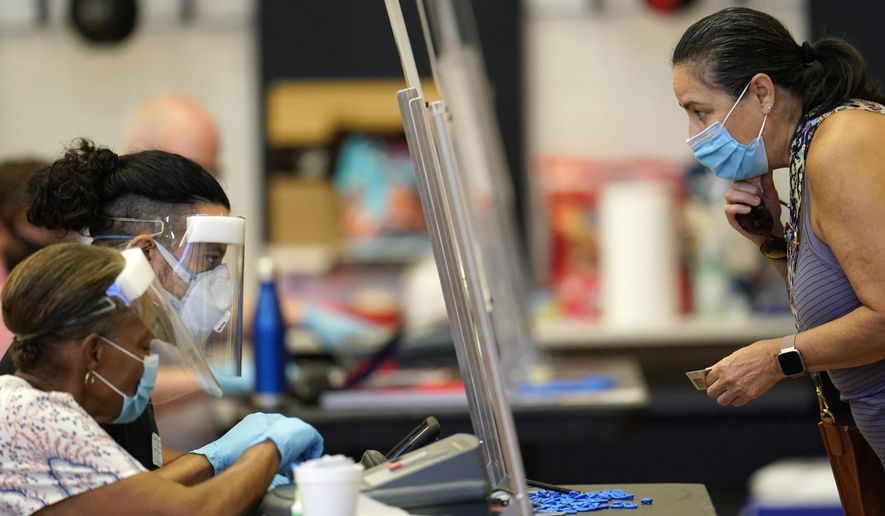Eugene Howard says fighting against the odds is in his DNA.
As the president of his local NAACP chapter in Missouri County, Texas, Mr. Howard said he was one of the only local Democrats to try to work with Republicans on the hot-button issue of instituting a racial justice overhaul of policing.
Now, Mr. Howard is taking on the challenge of trying to oust GOP Rep. Troy Nehls in Texas’ 22nd District.
As a seventh-generation Texan, Mr. Howard credits his fortitude to his ancestry, which includes family members who fought for the Union in the Civil War.
“Before then, I was three-fifths [of a human] and even after, I was three-fifths of a person,” Mr. Howard told The Washington Times. “So, I wanted to continue the legacy of serving and fighting for freedom.”
Texas’s 22nd District houses Houston’s growing suburbs and much of Pearland and Sugar Land. It’s one of the districts across the country that may expect to completely change as a result of redistricting.
Joshua Blank, a political science professor at the University of Texas, said the district is poised to lose its Republican edge.
“The growth patterns are going to make it difficult to keep that shape exactly just because of the way that all of the city centers are grown out,” Mr. Blank said. “It’s going to be very difficult to imagine a district that looks exactly like that or is more Republican.”
That may give Mr. Howard a slight boost, though the Democrat first has to get through a primary election that is expected to have several contenders.
Still, with the GOP-dominated legislature in charge of drawing districts and an electorate that historically tilts Republican, Mr. Howard would have plenty of challenges.
The nonpartisan Cook Political Report currently lists this district as being R+10.
Mr. Nehls’s office did not respond to a request for comment for this article.
“It may be a tighter race than expected, but I predict Nehls will take it by four points,” said Sherri Mora, a political science professor at Texas State University.
She added, however, that Mr. Nehls doesn’t have as much name recognition yet that may help energize momentum for a Democratic challenger.
“A Democratic contender may, in fact, be able to create a narrative that might resonate in that area,” Ms. Mora said. “We might see something energized there.”
Mr. Nehls, a freshman in the House, is the former Fort Bend County Sheriff who won his election against his Democratic challenger in 2020 by about five points.
The seat was left open by the retirement of Republican Rep. Pete Olson.
Mr. Nehls was also one of 126 House Republicans who objected to certifying some of the electoral college votes in President Biden’s 2020 election win.
Mr. Howard has hit at his opponent on that issue, though the events of Jan. 6 and the 2020 election disputes are not expected to sway the district’s voters as much as issues like COVID-19 or voting rights.
“These issues will be raised by both sides when campaigns ramp up into gear, however, I don’t see an impact on the outcome,” Ms. Mora said. “Texans, like others across the country, have become quite polarized and little that is said moves them from one position to another.”
Mr. Howard has proposed an ambitious vision for the country. He wants to increase access to voting, affordable health care and housing.
He also wants to create special subsidies and offer grants to small businesses, while expanding the definition of the nuclear family to make it more inclusive for the LGBT community.
Mr. Howard said voting rights hit home in the district after Texas was thrust into the national spotlight with the fight over the GOP-run state Legislature passing new voting laws, which Gov. Greg Abbott, a Republican, is expected to sign.
“There is no more prevalent issue than access to democracy and access to the ballot box,” Mr. Howard said, referring to his state as the “most restrictive voting accessible state in the country.”
In July, more than 50 Texas Democrats fled the state in protest of a bill they argued would restrict voting rights.
Both houses of the Texas Legislature passed legislation that adds voting rules such as requiring voters to provide a driver’s license number to get a mail-in ballot and making it a felony to send unsolicited absentee ballots to voters.
As the youngest president of his NAACP branch, Mr. Howard said he learned about the importance of working with those he may not always agree with.
He worked with the Pearland Police Department to identify 26 areas that the police and members of the NAACP thought could enhance the relationship between law enforcement and the Black community.
Mr. Howard said his goal is not just to focus on racial justice in his campaign, though it’s a component.
“I’m not just a Black candidate. I’m not just a minority candidate. I’m a candidate of the people,” he said. “Everyone deserves to have a voice. Everyone deserves to be heard, and have input on the decisions that affect us as a society.”
Texas’s primary election is scheduled for March 1, 2022.
• Mica Soellner can be reached at msoellner@washingtontimes.com.




Please read our comment policy before commenting.